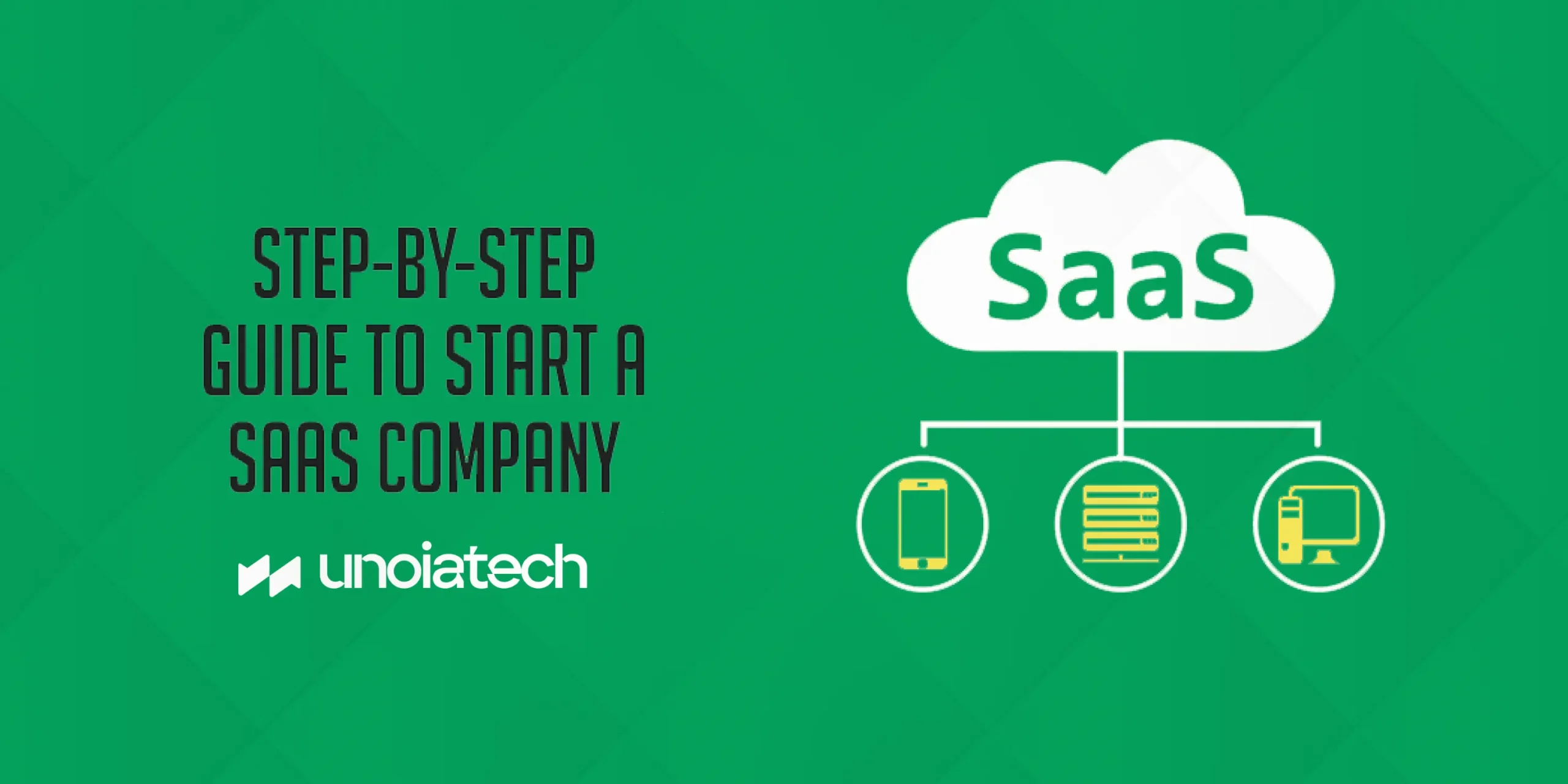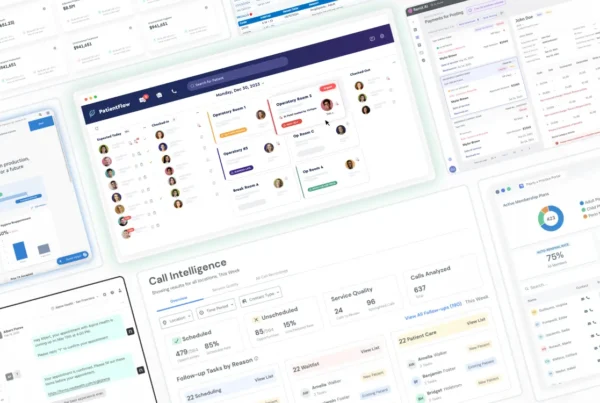
The SaaS company model has transformed the business world over the last decade. It’s easy to see why: SaaS companies typically have lower entry barriers compared to traditional businesses. Many entrepreneurs have rethought their business ideas because of the growing demand for SaaS products.
These companies can be highly profitable, with the added benefit of being agile and innovative. The SaaS industry continues to expand rapidly, with the global market projected to reach $334 billion by 2027.
If you’re planning to start a SaaS company in 2024, it’s time to consider factors like customer acquisition, lifetime value (LTV), key metrics, and building a minimum viable product (MVP). Now is the perfect time to jump into this thriving market and create your own SaaS company.
What Is a SaaS Company?
A SaaS company delivers services to customers through software. These companies manage the entire product lifecycle—from development to hosting and maintenance.
Customers access and use the software online, usually through a subscription-based pricing model, paying monthly or annually for the service. Many SaaS companies also offer a free trial period, allowing customers to try the software before committing to a subscription.
How to Get Ideas for Your SaaS Company
To come up with ideas for your SaaS company, focus on identifying a problem that can be solved with software. Start by examining the issues faced by you, your co-founder, or others in your industry.
Once you’ve pinpointed a problem, think of ways to solve it through a software application. Another approach is to analyze existing solutions in the market and find areas for improvement, whether it’s a new feature or a more user-friendly design.
After you’ve generated ideas, it’s crucial to validate them by talking to potential customers. This step ensures there’s a demand for your solution and that people are willing to pay for it. Market research, surveys, and interviews can help you refine and validate your business idea.
SaaS Startup Plan: Steps to Start Your SaaS Company
Starting a SaaS company may seem challenging, but following these steps can simplify the process.
1. Develop a Great Idea
The first step is to come up with a solid idea for a software application that solves a specific problem. Once you have a concept, validate it with potential customers to assess the market need and gauge whether they’d pay for your solution.
2.Build a High-Quality Software Application
After validating your idea, focus on developing a top-notch software product that meets customer needs. User-friendly design and strong functionality are key to attracting and retaining customers. Make sure your application stands out by incorporating unique features and solving the problem effectively.
3. Create a Sales and Marketing Strategy
Next, develop a marketing plan to reach potential customers. This can include creating a website, using social media, and targeting professionals through platforms like LinkedIn. Once you start acquiring customers, focus on retaining them by delivering value and ensuring their satisfaction.
4. Provide Excellent Customer Support
Customer support is crucial for the success of your SaaS company. Happy customers are more likely to stay loyal and spread the word about your product. Ensure that any issues are promptly addressed, and that you provide a seamless user experience.
5. Manage Your Cash Flow Carefully
Managing cash flow is especially important for SaaS companies, which usually operate on a subscription basis. Closely monitor your income and expenses to ensure that your business remains financially healthy.
Things to Avoid While Starting a SaaS Company
Starting a SaaS company can be exciting, but there are pitfalls that can negatively impact your business’s growth and success. Here are some key things to avoid:
1. Don’t Try to Solve Every Problem
It’s crucial to focus on solving a specific problem. Attempting to tackle too many issues can overcomplicate your software, making it harder to use, market, and sell. It’s better to solve one problem exceptionally well rather than offer a mediocre solution for multiple problems. Keep your focus narrow when launching your SaaS company.
2. Don’t Build a Solution That Nobody Wants
One of the most common mistakes is creating software without validating the idea with potential customers. If no one is interested in your solution, it will be difficult to succeed. Conduct market research, engage with potential customers, and make sure there’s demand before you start developing your software.
3. Don’t Skimp on Marketing
Many SaaS companies fail to invest enough in marketing. Without a strong marketing strategy, it becomes difficult to acquire new customers. SaaS businesses rely heavily on continuous customer acquisition, so it’s vital to invest in marketing efforts from the beginning and maintain them as your business grows.
4. Don’t Forget About Customer Support
Good customer support is essential for retaining customers and maintaining a positive reputation. SaaS companies should prioritize customer satisfaction, ensuring that users are supported and happy with the software. Poor customer support can lead to churn and negative feedback, damaging your business in the long run.
5. Don’t Ignore Cash Flow
Cash flow is often overlooked by startups, particularly in SaaS models where revenue comes through subscriptions. Be mindful of your expenses and income to ensure you have enough cash flow to cover costs, especially during the early stages when revenue might be slow to build up.
To succeed in launching a SaaS company, you should focus on solving a specific problem, building a strong marketing strategy, providing excellent customer support, and carefully managing your cash flow.
Challenges of Starting a SaaS Company
Starting a SaaS company comes with its own set of challenges. Here’s what you can expect:
1. Developing a Solution People Want
One of the toughest parts of starting a SaaS company is creating a solution that customers need. This requires not only having a great idea but also validating it with potential users. You’ll need to develop high-quality software and market it effectively to succeed.
2. Acquiring and Retaining Customers
Customer acquisition and retention are significant challenges for SaaS companies. After developing your software, you must build a marketing and sales strategy to reach potential customers. Once they sign up, keeping them happy with your service is key to building long-term success.
3. Managing Cash Flow
SaaS businesses generally rely on subscription-based models, meaning steady revenue streams are crucial. Managing cash flow can be difficult, especially in the beginning when your customer base is still growing but costs are high.
Operational Challenges for SaaS Companies
Running a SaaS company day-to-day involves several operational hurdles:
1. Managing the Server Infrastructure
Keeping servers operational, monitoring usage, and scaling your infrastructure as your customer base grows is a significant operational challenge. Downtime can lead to unhappy customers and lost revenue.
2. Handling Customer Support
Providing prompt and effective customer support is essential for customer satisfaction. SaaS businesses must ensure that their support teams are equipped to handle customer inquiries and issues swiftly.
3. Managing Updates and Maintenance
Your software will need constant updates, bug fixes, and feature improvements to stay competitive. This requires an ongoing commitment to maintenance and development.
4. Ensuring Security and Compliance
Data security and compliance with industry standards are crucial for SaaS companies. You must ensure that your software meets security regulations and that sensitive customer data is protected.
Financial Challenges for SaaS Companies
Financial management is another critical aspect of running a successful SaaS company:
1. Managing Cash Flow
Cash flow is a challenge for SaaS companies due to their subscription-based revenue models. Steady income is necessary to cover operational costs, but it can be difficult to manage in the early stages when customer numbers are low.
2. Planning for Expansion
Expanding your SaaS company requires careful financial planning, as growth will demand investment in infrastructure and talent. Rapid scaling can strain resources if not managed properly.
3. Pricing the Software
Choosing the right pricing model is tricky. Your pricing needs to cover operational costs while also being attractive enough for customers. Finding this balance is crucial to maintaining profitability.
4. Raising Capital
Securing funding can be challenging, especially for SaaS companies that are not yet profitable. Raising capital to fuel growth and cover operational expenses is often necessary but can be difficult to achieve.
By understanding and preparing for these challenges, you’ll be better equipped to navigate the ups and downs of starting a SaaS company.
Examples of Successful Software as a Service (SaaS) Solutions Startups
Many SaaS companies have managed to overcome early challenges and grown into successful, influential businesses. Below are some prominent examples:
1. Salesforce
Salesforce is a pioneer in customer relationship management (CRM) software. It provides businesses with tools to manage and track customer data, offering various subscription plans to fit different business needs.
2. HubSpot
HubSpot offers marketing, sales, and customer service software, designed to help businesses attract, engage, and convert leads. Like other SaaS products, HubSpot operates on a subscription-based model, with different pricing tiers for companies of all sizes.
3. Zendesk
Zendesk delivers customer service and support software that helps businesses handle customer queries and complaints efficiently. It follows the subscription-based pricing model, offering flexible plans for companies.
4. MailChimp
MailChimp is a popular email marketing platform that assists businesses in creating, sending, and analyzing email campaigns. It operates with a subscription model, providing businesses with different pricing options based on their needs.
5. Adobe Creative Cloud
Adobe Creative Cloud is a suite of design and editing tools aimed at creative professionals such as graphic designers and photographers. Like other SaaS companies, Adobe’s Creative Cloud is subscription-based, offering various pricing tiers.
These companies are just a few examples of successful SaaS startups that have grown into dominant players in their respective industries. Each provides a solution with a subscription-based pricing model and unique features to address specific business needs.
FAQs
Can you start a SaaS company without any technical expertise?
Yes, it’s possible to start a SaaS company without technical expertise, but it can be difficult. It is advisable to partner with a co-founder who has software development experience to help build and maintain the product.
How can I start a SaaS business with no money?
You can start a SaaS company with little to no money by bootstrapping, partnering with a co-founder who can invest time and resources, or seeking investment from venture capitalists or angel investors.
How easy is it to start a SaaS company?
Starting a SaaS company is not easy. You will face challenges like software development, pricing, and raising capital. However, with the right planning and execution, it can be a lucrative business model.
What are the most common mistakes when starting a SaaS company?
Common mistakes include failing to understand the market and competition, not having a solid business plan, and not assembling the right team for growth.
How long does it take to know if a SaaS startup is successful?
It can take years to determine the success of a SaaS company. The timeline depends on factors such as software complexity, market demand, and capital raised.
In Conclusion
Starting a SaaS company can be an excellent opportunity for growth and profitability. However, challenges such as software development, pricing strategy, and capital raising can make it difficult. Success may take several years to achieve, depending on various factors like market demand and product complexity.
Ready to Build Your Own SaaS Success Story?
At Unoiatech, we specialize in helping businesses bring their SaaS vision to life. Whether you’re looking to scale, optimize, or launch from scratch, our team has the expertise to make it happen. Want to see how we helped one of our clients build a $900M SaaS product? Check out our case study here and discover how we can do the same for you.








